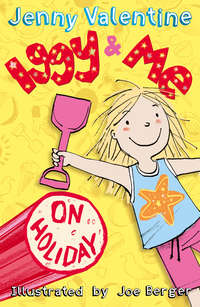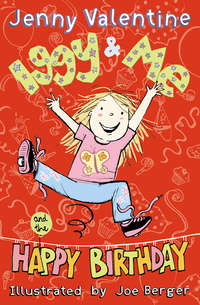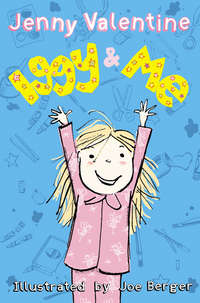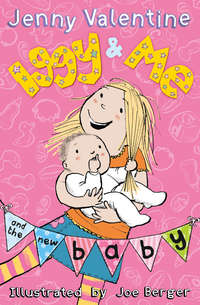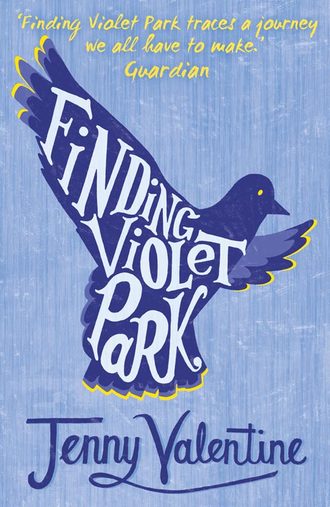
Полная версия
Finding Violet Park

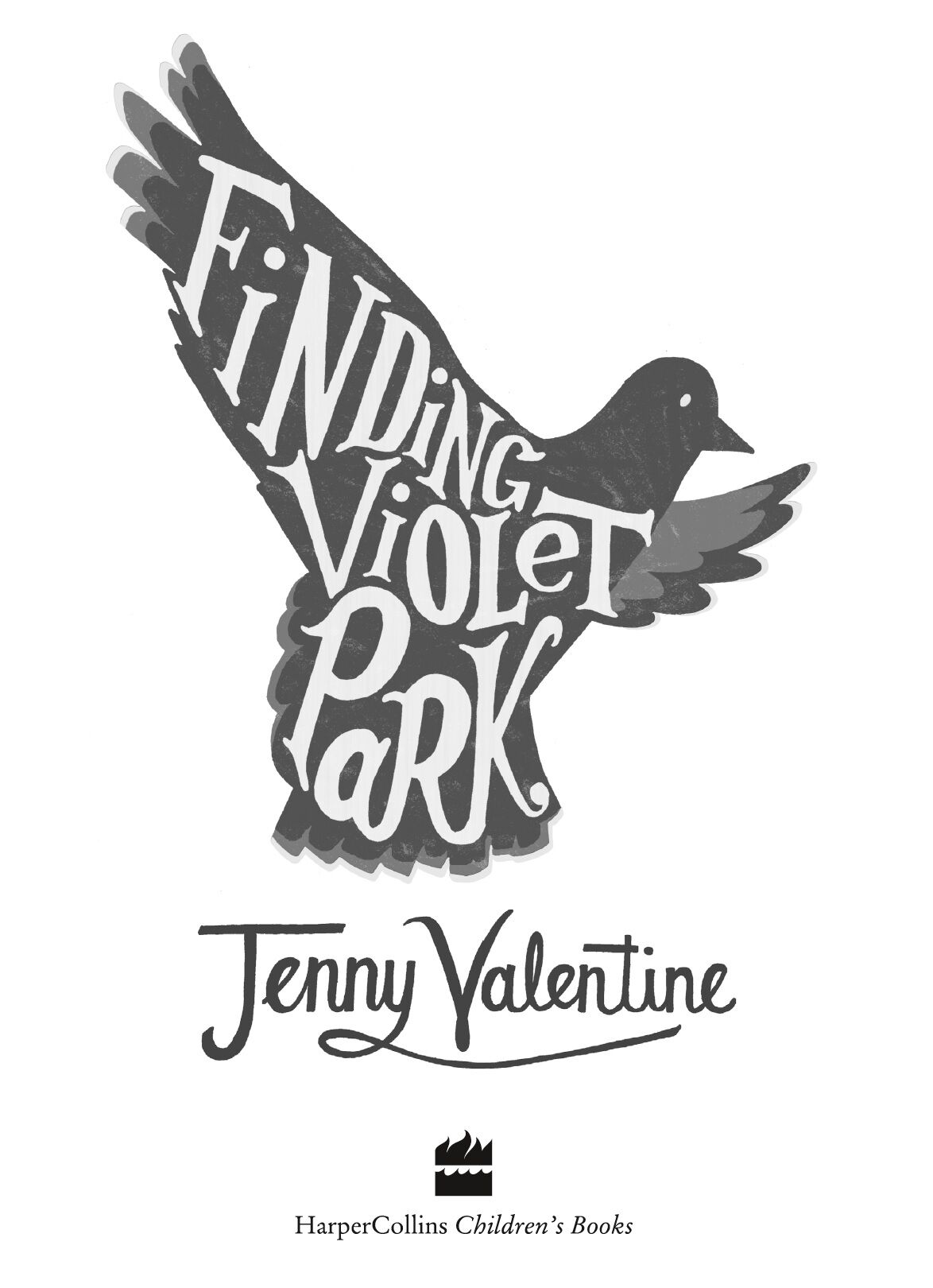
Copyright
Harper Collins Children’s Books is a division of HarperCollins Publishers Ltd 1 London Bridge Street London SE1 9GF
www.harpercollins.co.uk
Copyright © Jenny Valentine 2007
First published in hardback in Great Britain by Harper Collins Children’s Books 2007
Jenny Valentine asserts the moral right to be identified as the author of the work.
All rights reserved under International and Pan-American Copyright Conventions. By payment of the required fees, you have been granted the non-exclusive, non-transferable right to access and read the text of this e-book on screen. No part of this text may be reproduced, transmitted, downloaded, decompiled, reverse engineered, or stored in or introduced into any information storage and retrieval system, in any form or by any means, whether electronic or mechanical, now known or hereinafter invented, without the express written permission of HarperCollins e-books.
Source ISBN: 9780007291243
Ebook Edition © JUNE 2012 ISBN: 9780007394043
Version: 2015-04-01
HarperCollinsPublishers has made every reasonable effort to ensure that any picture content and written content in this ebook has been included or removed in accordance with the contractual and technological constraints in operation at the time of publication.
For Alex and his Tardis Heart
Contents
Cover Page
Title Page
Copyright
ONE
TWO
THREE
FOUR
FIVE
SIX
SEVEN
EIGHT
NINE
TEN
ELEVEN
TWELVE
THIRTEEN
FOURTEEN
FIFTEEN
SIXTEEN
SEVENTEEN
EIGHTEEN
NINETEEN
TWENTY
TWENTY-ONE
TWENTY-TWO
TWENTY-THREE
TWENTY-FOUR
TWENTY-FIVE
TWENTY-SIX
TWENTY-SEVEN
TWENTY-EIGHT
TWENTY-NINE
Keep Reading
Acknowledgments
About the Author
Books by Jenny Valentine
About the Publisher
ONE
The mini cab office was up a cobbled mews with little flat houses either side. That’s where I first met Violet Park, what was left of her. There was a healing centre next door – a pretty smart name for a place with a battered brown door and no proper door handle and stuck on wooden numbers in the shape of clowns. The 3 of number 13 was a w stuck on sideways and I thought it was kind of sad and I liked it at the same time.
I never normally take cabs but it was five o’clock in the morning and I was too tired to walk anywhere and I’d just found a tenner in my coat pocket. I went in for a lift home and strolled right into the weirdest encounter of my life.
It turns out the ten pounds wasn’t mine at all. My sister Mercy had borrowed my coat the night before – without asking – even though boys’ clothes don’t suit her and it was at least two sizes too big. She was livid with me about the money. I said maybe she should consider it rent and wouldn’t the world be a better place if people stopped taking things that didn’t belong to them?
It’s funny when you start thinking about pivotal moments like this in your life, chance happenings that end up meaning everything. Sometimes, when I’m deciding which route to take to, say, the cinema in Camden, I get this feeling like maybe if I choose the wrong route, bad stuff will happen to me in a place I never had to go if only I’d chosen wisely. This sort of thinking can make decisions really really difficult because I’m always wondering what happens to all the choices we decide not to make. Like Mum says, as soon as she married Dad she realised she’d done the wrong thing and as she was walking back down the aisle, she could practically see her single self through the arch of the church door, out in the sunlight, dancing around without a care in the world, and she could have spat. I like to picture Mum, dressed like a meringue with big sticky hair, hanging on to Dad’s arm and thinking about gobbing on the church carpet. It always makes me smile.
Whatever, Mercy decided to borrow my coat and she forgot to decide to remove the money and I decided to spend the whole night with my friend Ed in his posh Mum’s house (Miss Denmark 1979 with elocution lessons) and then I made the choice to take a cab.
It was dark in the Mews, blue-black with a sheen of orange from the street lamps on the high street, almost dawn and sort of timeless. My shoes made such a ringing noise on the cobbles I started to imagine I was back in time, in some Victorian red light district. When I stepped into the minicab office it was modern and pretty ugly. One of the three strip lights on the ceiling was blinking on and off, but the other two were working perfectly and their over-brightness hurt my eyes and made everyone look sort of grey and pouchy and ill. There were no other punters, just bored sleepy drivers, waiting for the next fare, chain smoking or reading three-day-old papers. There was a framed map of Cyprus on one wall and one of those gas fires that they reckon are portable with a great big bottle you have to fit in the back. We had one like that in the hostel when we went on a school journey to the Brecon Beacons last year. Those things are not portable.
The controller was in this little booth up a few stairs with a window looking down on the rest of them and you could tell he was the boss of the place as well. He had a cigar in his mouth and he was talking and the smoke was going in his eyes so he had to squint, and the cigar was bouncing up and down as he talked and you could see he thought he was Tony Soprano or someone.
Everybody looked straight at me when I walked in because I was the something happening in their boring night shift and suddenly I felt very light headed and my insides were going hot and cold, hot and cold. I’m pretty tall for my age but them all staring up at me from their chairs made me feel like some kind of weird giant. The only person not staring at me was Tony Soprano so I kind of focused on him and I smiled so they’d all see I was friendly and hadn’t come in for trouble. He was chomping on that cigar, working it around with his teeth and puffing away on it so hard his little booth was filling up with cigar smoke. I thought that if I stood there long enough he might disappear from view like an accidental magic trick. The smoke forced its way through the cracks and joins of his mezzanine control tower and it was making me queasy so I searched around, still smiling, for something else to look at.
That’s when I first saw Violet. I say “Violet” but that’s stretching it because I didn’t even know her name then and what I actually saw was an urn with her inside it.
The urn was the only thing in that place worth looking at. Maybe it was because I’d been up all night, maybe I needed to latch on to something in there to stop myself from passing out, I don’t know, I found an urn. Halfway up a wood panelled wall, log cabin style, there was a shelf with some magazines on and a cup and saucer, the sort you find in church halls and hospitals. Next to them was this urn that at the time I didn’t realise was an urn, just some kind of trophy or full of biscuits or something. It was wooden, grainy and with a rich gloss that caught the light and threw it back at me. I was staring at it, trying to figure out what it was exactly. I didn’t notice that anyone was talking to me until I got the smell of cigar really strongly and realised that the fat controller had opened his door because banging on his window hadn’t got my attention.
“You haven’t come for her have you?” he asked and I didn’t get it but everyone else did because they all started laughing at once.
Then I laughed too because them all laughing was funny and I said “Who?”
The cigar bobbed down towards his chin with each syllable and he nodded towards the shelf. “The old lady in the box.”
I didn’t stop laughing, but really I can’t remember if I thought it was funny or not. I shook my head and because I didn’t know what else to say I said, “No, I need a cab to Queens Crescent please,” and a driver called Ali got up and I followed him out to his car. I walked behind him down the mews and out into the wider space of the high street.
I asked Ali what he knew about the dead woman on the shelf. He said she’d been around since before he started working there, which was eighteen months ago. Somebody had left her in a cab and never collected her and if I wanted to know the whole story I should speak to the boss whose name I instantly forgot because he was always Tony Soprano to me.
The sun was coming up and the buildings with the light behind them looked like their own shadows, and I thought, how could anyone end up on a shelf in a cab office for all eternity? I’d heard of Purgatory, the place you get to wait in when Heaven and Hell aren’t that sure they want you, but I’d never thought it meant being stuck in a box in Apollo Cars forever. I couldn’t get the question out of my head, felt it burrowing down to some dark place in my skull, waiting for later.
Thinking about it now, it’s all down to decision making again, you see. My better self didn’t get in the cab straight away that morning. My better self strode right back in and rescued Violet from the cigar smoke and the two-way radio and the instant coffee and the conversation of men who should have known better than to talk like that in front of an old lady. And after liberating her from the confines of the cab office, my better self released her from her wooden pot and sprinkled her liberally over the crest and all the four corners of Primrose Hill while the sun came up.
But my real self, the disappointing one, he got in the car with Ali and gave him directions to my house and left her there alone.
My name is Lucas Swain and I was almost sixteen when this began, the night I stayed too late at Ed’s house and met Violet in her urn. Some things about me in case you’re interested. I have a mum called Nick and a dad called Pete (somewhere) and a big sister called Mercy, the clothes borrower, who I’ve mentioned. She’s about at the peak of a sarcastic phase that’s lasted maybe six years already. I also have a little brother called Jed.
Here’s something about Jed. On the days I take him to school he always thinks up a funny thing to tell me. We are always at the same place when he tells me this funny thing, the last stretch once we’ve turned the corner into Princess Road. You can tell when Jed’s thought of something early because he can’t wait to get there, and on the days he’s struggling to come up with it he drags his feet and we end up being late, which neither of us minds. The punch line is my brother’s way of saying goodbye.
The other cool thing about Jed is that he’s never met our dad and he’s not bothered. Dad went missing just before Jed was born so they’ve never set eyes on each other. Jed doesn’t know him at all.
There’s a lot of that with Dad, the not knowing. Mum slags him off for abandoning us, and I half listen and nod because it makes her feel better. But I worry that she’s not being fair because if he got hit by a bus or trapped in a burning building or dropped out of a plane, how was he supposed to let us know?
I saw a film once about an alien who landed on earth in a human body in a mental hospital. He had all this amazing stuff to teach everyone and he kept telling the doctors who he was and where he was from and what he had to offer in the way of secrets of the universe and stuff, but they just thought he was mad and pumped him full of drugs and he stayed there until he died. Maybe something like that happened to my dad. He wants more than anything to call us and it’s been five years, and wherever he’s locked up he’s not allowed to phone and he’s just waiting for us to find him. This sort of thought, and other variations, occur to me at least once every day.
Like I said, it’s the not knowing that’s hard.
TWO
Ali dropped me off in his cab and even though everyone was about to get up at home I went straight to bed. Mum walked past my room a couple of times in her pyjamas, giving me her special “You stayed out too late” look, but I pretended not to notice.
I lay there for ages but I couldn’t sleep. Jed had Saturday morning telly on too loud. Mum was joining in with something really lame on the radio. Mercy had found my coat on the stairs and was slamming doors and ranting about the money I spent getting home, but it wasn’t them keeping me awake. All that’s quite normal for a Saturday and I usually sleep right through. Every time I closed my eyes, the urn was there on its crappy shelf, glaring at me, which was unsettling and made me open my eyes again. It was the strangest feeling, being reproached by an urn.
I got out of bed and put my clothes back on and went for a walk on the heath. It was a beautiful day, all vast blue sky and autumn colours and a clean breeze that made me forget I’d had no sleep, but I couldn’t relax into it. That part of the heath is covered with enormous crows. They’ve got massive feet and they walk around staring at their massive feet like they can’t believe how big they are. They all look like actors with their hands behind their backs, rehearsing the bit in that play when the king says “Now is the winter of our discontent …”
I watched them for a while and then I walked up to the top of kite hill and ate an apple. You can see the whole of London from up there pretty much: St Paul’s, the Telecom tower, the buildings at Canary Wharf and the docks. There were a few runners on the athletics track just below me and plenty of dog walkers and little kids, but not many old ladies and that set me wondering what all the old people who live in London got up to with their time.
What did the old lady in the cab office do before she did nothing all day in that urn?
Did she get up really, really early in the morning like most old people? Mum says that’s their work ethic, the same reason old men wear suits and ties instead of tracksuit bottoms, and old ladies queue up outside the post office half an hour before it even opens and have really clean curtains and stuff. But doesn’t getting up that early just mean there are more hours to fill with being old?
Before then I’d never thought what it was actually like to be a pensioner. I’d just weaved in and out of them on the pavement, and smirked with my friends at their funny hair and high-waisted trousers, and the way they make paying for something at a checkout last for ages just to have someone to talk to. One minute the thought never crossed my mind, the next I was really and truly concerned about what it was like to be old and stuck in London, where everyone moved faster than you and even the simplest thing could end up taking all day.
It was her. I know it was. It was my old lady, the dead one in the urn.
I remember sitting there on the hill with kites whipping through the air behind me and the thought occurring to me that she and I might actually be having some kind of conversation. A dead old lady was trying to educate me about the over-sixties from her place on the shelf. It was a good feeling, a hairs-on-the-back-of-your-neck feeling, like when you hear a wicked bit of music, or when you’re high and someone you’re really into is sitting next to you. I suspected I was making it up but that hardly mattered. I make a lot of things up that are important to me, like being irresistible to girls, or being moody and mysterious like my dad, or what my dad might be up to at any moment, even this one.
THREE
I walked home the long way so I could watch what was going on. The street we live on is a good place, I think. It’s a market street, fruit and veg every day, and then other things on Thursdays and Saturdays, like fresh fish and feather dusters and crap clothes and other stuff Mercy reckons is all nicked. One time, one of the blokes from the market fell in the road and nearly got hit by his own van, and Mercy went, “Oh look, he’s fallen off the back of a lorry,” and I laughed so hard.
The market end of the street is what my mum and her friends call the “dodgy” end. I don’t know when my mum became such a snob about the dodgy and not dodgy ends of life. We’re only here because Dad’s mum and dad took pity on us when he disappeared and let us move in, and then they went into sheltered housing round the corner. Before that we lived in a dump and she wasn’t snobby about stuff then.
The other interesting thing about our street is that it’s called a crescent, but as far as I can make out it’s actually dead straight.
We live in a whole house, which is rare nowadays in this part of London. More and more people are fitting into smaller and smaller spaces, like in New York. Mum talks a lot about selling up and moving out of London where she could get loads more for her money. Grown-ups spend a lot of time talking about the price of houses and how much they could add to the price of a house if they painted the kitchen terracotta and fitted a power shower. It’s like they’re never happy with the way things are and they think they’ll be happier if the bathroom looks different. I don’t know why Mum bothers with all that when she’s not going anywhere.
Here’s how I know.
For a start, Mum would go mad in the country in about five minutes. Even when we went to Bath for the day to see all the Roman stuff, she kept commenting on how small minded and provincial people were and how nobody in the countryside has any “spatial awareness”.
Also Jed would miss his friends, and Mercy would throw a total tantrum and leave home to live in sin in a damp bedsit with her boyfriend, and I wouldn’t go either without a fight.
You probably can’t even get that much more for your money elsewhere; that’s just something estate agents tell you because they want to get their hands on the family home.
Plus when Dad comes back we have to be here or he’ll never find us.
That’s what happens when someone disappears. They trap you in time. You can’t change anything, not drastically, because it’s the same as giving up hope. I’ve changed loads since he left, I’ve grown maybe about a metre and I shave almost every two days, and my hair is way longer too. He might not even recognise me if he did knock on the door and I answered it, but I can’t help that and I’m definitely against changing anything else just in case.
My dad was a pretty cool guy. In all the photos I’ve seen of him he looked good. There’s no evidence of him wearing high-heeled shoes or jackets that were two sizes too small or ridiculous sideburns, like other people’s dads. He seemed to stand alone for effortless cool in a room full of serious fashion errors.
Now I wear my dad’s suits and shirts and stuff because they just about fit me. I wouldn’t let Mum throw them out because I was expecting him back any time. And I suppose it makes me quite proud that I’m big enough now, almost as tall as dad was when he went, with exactly the same size feet (nine and a half), but it guts me too because in all the time that it’s taken me to grow up he hasn’t come back.
Mum hates me wearing Dad’s stuff. The first time I did it she burst into tears. She says I am already enough like he was when she first met him, and she feels sorry for the girl that’s going to fall in love with me because it hasn’t exactly been a picnic from her point of view.
The thing about my dad though, he didn’t just look cool, he actually was, and no amount of wearing his clothes is going to make me him, or even nearly him, ever. My dad was a journalist. I remember him as the man in the room that people wanted to be next to, the one they were interested in. I’m more like the one in the room that people forget is there.
Mum and Dad might even have been in love before they got married. I think they were having the time of their lives until Mum got pregnant with Mercy. Everyone was really down on them for doing it without rings on their fingers, so they did the right thing in a church before the bump that became Mercy was big enough to show. Mum says it wasn’t Mercy that screwed things up, because Dad loved being a dad. It was the getting married that really hacked him off because he hated doing what he was told.
What is it about people that makes them want to get married anyway? I don’t know how anyone could ever be sure enough of something like that. I can’t decide how to get to school. I can’t order food in a caff without spending the rest of the meal worrying I’ve made the wrong choice. I don’t reckon I’ll ever be able to do it. And on the evidence I’ve got, meaning my family (exhibit A: big empty space where a husband and dad used to be) I’m not sure it’s even worth the bother.
And how come if Mum knew it was a bad idea the moment she’d done it, she didn’t have the sense to know it a week or a day or even ten minutes earlier? I just don’t get it. And when I see what Mum’s left with after so many years, and hear her complaining that she can’t even remember loving Dad or wanting kids or whatever, it makes no sense to me at all.
It makes me determined to do life with my eyes open, even if it means making no decisions at all.
FOUR
On Monday, instead of double geography and French, I went back to the mini cab office for another look at the urn. There were more people around, the shops were open on the high street and there were some last ditch battles for parking. Basically, a much less attractive place when awake, but the mews itself was pretty quiet. There was a lady walking up and down and the way she was walking had this strange rhythm, like four steps forward – stop – up on tiptoes – stop – three steps forward – stop, and when she got to the top of the mews she turned round and started again.
When I passed her she said, “Sorry to ask, but can you spare a cigarette?” and she made me jump and I said “No” and took my hands out of my pockets to show her I wasn’t hiding any. And I wasn’t, because I might smoke weed now and again, but I would never smoke tobacco for these reasons, among others.
1 It doesn’t get you high. What’s the point of being addicted to something that will kill you and doesn’t even make you laugh or feel good or anything?
2 It kills you.
3 It smells bad.
4 Cigarettes cost very little to make but there’s a load of tax on them that goes straight to the government, making them rich. That means the people who are supposed to take care of our health and welfare and help keep the fabric of society together are making a profit out of something really addictive that doesn’t get you high and will kill you. Also I’m not old enough to vote so I’m avoiding tax generally, where I can help it.
5 Mercy told me something about the tobacco giants ripping off their farmers and paying them next to nothing. Mercy’s boyfriend smokes American Spirit, which are fair trade and organic, apparently, if you can get your head round the idea of an organic cigarette.
6 Not-organic cigarettes contain about 250 poisonous toxins which will also kill you.
I stood outside Apollo Cars for a while, with the lady pacing behind me, and I tried to think about what I might say when I went in. There were those vertical Venetian blinds in the window, like you see in dentists and too-trendy apartments, the kind that are made out of plasticky cardboard pieces held together with cheap chains made of tiny ball bearings. The blinds were really dirty, but I liked the way they cut up the view inside, as if somebody got a photo of a minicab office out of a magazine and cut it into strips. If I took a step to the right I could see the urn on its shelf, and if I moved back to where I was it disappeared from view and I could see somebody’s profile and the front page of two different newspapers. The urn looked so precious in there compared to everything else, so completely out of place.


